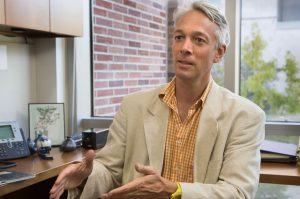The biological, biomedical and health sciences are undergoing a fundamental transformation catalyzed by a dramatic increase in diverse and quantitative data (e.g. molecular, cellular, organismal, ecological, behavioral, clinical). The availability of both awesome measurement capabilities and electronic databases are transforming the biosciences into an information-intensive science that will accelerate the pace of discovery, the development of theory, and our capabilities for accurate predictions.
 The Institute for Quantitative and Computational Biosciences seeks to realize these unprecedented opportunities, while leading and safeguarding this transformation by addressing the tremendous computational, algorithmic, educational, and cultural challenges implicit in Big Data biosciences.
The Institute for Quantitative and Computational Biosciences seeks to realize these unprecedented opportunities, while leading and safeguarding this transformation by addressing the tremendous computational, algorithmic, educational, and cultural challenges implicit in Big Data biosciences.
A hallmark of QCB is the integration of (i) Big Data analysis and modeling tools, and (ii) the power of mechanistic computational modeling approaches that leverage decades of fundamental biological knowledge. Integrating the two will allow us to not only analyze complex data and make unexpected discoveries, but also gain fundamental insights and develop predictive power at scales far beyond available measurements.
Charles Darwin’s genius lay in the ability to make sense of countless observations made intensively with a specific bio/eco-system (the Galapagos) and all over the planet. In the era of biomedical Big Data, I’d like to think that QCB’s mission is to support the current, and train the future Darwin’s of Big Data. However, QCB aims further: whereas Darwin was unaware of Mendel’s controlled empirical studies and one can only speculate what would have been had he brought the rigor of Mendelian inheritance laws to the conceptual framework of natural selection, QCB’s mission is to more fully realize the powerful synergies between the basic laboratory and the translational biosciences research enterprises.
I invite you to participate in this exciting revolution, join us and contribute to the development of solutions to the most pressing biosciences problems in health care, food and energy sustainability.
Alexander Hoffmann
Director of the Institute for Quantitative and Computational Biosciences (QCB)

